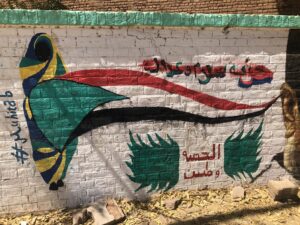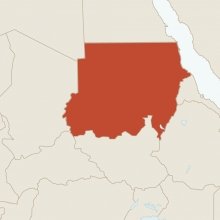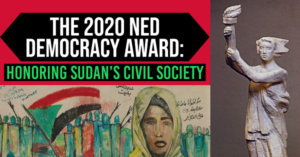The military coup in Sudan came as a shock to many observers even though civilian-military tensions had recently spiked. But Western states should have done more to aid the country’s fragile democratic transition, especially since autocratic powers may have facilitated or are at least likely to back the military intervention, some observers suggest.
Despite a vast and well-coordinated protest movement in favor of a transition to democracy, and an aggressive push by Western governments to support Sudan’s emergence from authoritarianism after the ousting of longtime dictator Omar Hassan al-Bashir in 2019, years of progress seemingly were swept away before most Sudanese had wiped the sleep from their eyes, the Post reports.
Fear that political reform would weaken the military’s grip on Sudan society led to the coup, analyst Ahmed Aboudouh writes for the Independent.
The U.S. announced the suspension of economic aid, while pro-democracy forces have organized a general strike to protest the coup.
 “We were very explicit that a military takeover of the civilian institutions would trigger a reevaluation of the types of commitments we have,” said Jeffrey Feltman, the U.S. Special Envoy for the Horn of Africa. He had been in Khartoum over the weekend working to “revive the partnership” between the military and civilian leadership, but did not “[see] this coming,” he told NPR.
“We were very explicit that a military takeover of the civilian institutions would trigger a reevaluation of the types of commitments we have,” said Jeffrey Feltman, the U.S. Special Envoy for the Horn of Africa. He had been in Khartoum over the weekend working to “revive the partnership” between the military and civilian leadership, but did not “[see] this coming,” he told NPR.
The ease with which Sudan’s top general Abdel Fattah al-Burhan was able to sweep aside his civilian counterparts underlined how strong his hand is, said Magdi el-Gizouli, a Sudanese analyst at the Rift Valley Institute.
“Burhan might be able to pull this off with the support of other allies, namely Egypt, the Saudis and the Emiratis,” he told the Post. “He is not a pariah like Bashir became, nor is he an Islamist. He will find a new, more pliant civilian face, he will maintain formalities, and the West will simply end up dealing with that person.”
External autocratic forces likely played a role behind the scenes, some analysts suggest.

NDI
The coup “is both a reflection of the limits of the U.S.’ leverage and its ability to shape outcomes in this region, but also a measure of the rising influence of Russian and Gulf State actors who were never fully supportive of the democratic transition in Sudan,” said Cameron Hudson, who served as the National Security Council’s Director of African Affairs during the Bush administration.
Tensions have long simmered within the pro-democracy movement, known as the Forces for Freedom and Change, but divisions ratcheted up after what the government said was a failed coup on September 21 this year, AFP reports. The mainstream FFC appealed on Monday for a nationwide campaign of “civil disobedience”.
Sudan risks “going back into a period of being shunned by the rest of the world” and not having the international financial and development assistance” it badly needs, said Alex de Waal, a veteran expert on Sudan and executive director of the World Peace Foundation.
 “Sudan’s historic democratic transition must not be derailed,” said NED President & CEO Damon Wilson. “The December Revolution was driven by a powerful grassroots citizen movement opposed to decades of repression, violence, and corruption. NED stands with the peaceful protestors who demand a civilian-led democratic transition in Sudan that respects freedom, peace, and justice.”
“Sudan’s historic democratic transition must not be derailed,” said NED President & CEO Damon Wilson. “The December Revolution was driven by a powerful grassroots citizen movement opposed to decades of repression, violence, and corruption. NED stands with the peaceful protestors who demand a civilian-led democratic transition in Sudan that respects freedom, peace, and justice.”
The NED urges the Sudanese military to:
- immediately release Prime Minister Hamdok and all detained ministers, government officials, and civilian political and civil society leaders;
- respect freedom of speech and assembly;
- respect peaceful demonstrations; and
- restore communications.

Rep. Karen Bass
Rep. Karen Bass (D-CA, right), Chair of the House Foreign Affairs Subcommittee on Africa, condemned the coup and urged the military to immediately release Prime Minister Abdalla Hamdok and all others unlawfully detained.
“I implore the military to adhere to the constitutional declaration signed in 2019, which was a negotiated agreement for an eventual civilian-led government through democratic elections,” said Bass, a NED board member. “I urge for an constructive, open dialogue involving all sides that upholds the negotiated agreement and allows the will of the Sudanese people to be heard.”
“The United States must use every diplomatic tool at our disposal to send a clear message to the Sudanese military that they must return to the barracks, demonstrate restraint and respect the rights of those who have taken to the streets to peacefully protest,” said U.S. Senator Bob Menendez (D-N.J.), Chairman of the Senate Foreign Relations Committee. “Our partners in the Arab world and elsewhere must also push for the release of the Prime Minister and other government officials, and a transfer of leadership to a civilian as required under the terms of the transitional constitution.”
 The situation presents a major challenge to the Biden administration, which pledged to assume a more involved role in promoting democracy, the Soufan Center contends. Special envoy Feltman sent a clear message to the would-be coup plotters, noting that “any changes to the transitional government by force puts at risk U.S. assistance.”
The situation presents a major challenge to the Biden administration, which pledged to assume a more involved role in promoting democracy, the Soufan Center contends. Special envoy Feltman sent a clear message to the would-be coup plotters, noting that “any changes to the transitional government by force puts at risk U.S. assistance.”
As in Egypt, the military’s economic interests appear to have played a decisive role in its calculations, observers suggest.
“The military had much to fear from passing this key milestone in the transition,” the International Crisis Group wrote in a post-coup update. “Under Bashir, the generals came to enjoy unchecked control of key economic sectors, running a web of companies with billions of dollars in assets. The Hamdok administration had sought to roll back these privileges by bringing many of the military’s companies under civilian management.”
Tensions have been growing for months between supporters of the military and of civilian rule, AP reports:
- The Forces for the Declaration of Freedom and Change, or FDFC, the main protest umbrella group, has been stepping up calls for the military to hand leadership over to civilians in the government. …It has also called for restructuring the military and security agencies to dismiss al-Bashir loyalists, absorb various armed factions into their ranks and be put under civilian supervision.
- Supporters of the military also stepped up action. Since September, tribal protesters have blocked the main road to Sudan’s Red Sea port as well as fuel pipelines, demanding Hamdok’s government be dissolved. Also, a pro-military splinter faction of the FDFC began an anti-government protest sit-in this month outside the Sovereign Council headquarters, accusing officials of mismanagement and monopolizing power.
 Many of the protesters on both sides are motivated by economic hardship. Already a problem under al-Bashir, it was one of the reasons people rose up against him, AP adds. But since then, the country has faced even greater shocks in trying to rejoin the global economy. Economic reforms implemented by the interim government have meant rising inflation and shortages of basic goods for the average citizen.
Many of the protesters on both sides are motivated by economic hardship. Already a problem under al-Bashir, it was one of the reasons people rose up against him, AP adds. But since then, the country has faced even greater shocks in trying to rejoin the global economy. Economic reforms implemented by the interim government have meant rising inflation and shortages of basic goods for the average citizen.
Western countries expressing shock and dismay at the upheaval should look in the mirror, considering the strictures that came with Sudan’s International Monetary Fund loans in recent years, says Rama Yade, Director of the Atlantic Council’s Africa Center.
“On the economic front, they should perhaps have supported this government rather than suffocating it with tough austerity measures that ended up plunging the population into despair and offering the military the ideal pretext they wanted to pull off this coup,” she adds.
 The European Union and its member states have named Sudan’s transition a generational opportunity deserving of fulsome support, notes Theodore Murphy, Africa program director at the European Council on Foreign Relations. So what can Europe do?
The European Union and its member states have named Sudan’s transition a generational opportunity deserving of fulsome support, notes Theodore Murphy, Africa program director at the European Council on Foreign Relations. So what can Europe do?
- Firstly, there is an urgent need for clear signalling. The military’s approach – trying to avoid the appearance of a coup to mitigate domestic but also international headwinds – indicates it is possible to impact on its calculus. By logical extension, the strength of international opposition will affect the military’s next steps and ultimately its preparedness to enter negotiations with the civilians, which is the only way out….
- Secondly, a decisive and unified European position will create traction with Egypt and the United Arab Emirates. While Europe supports the civilians, Sudan’s sharp-elbowed neighbours see their interests as better served by a military-led government. For these countries, Sudan’s political trajectory is a core national interest. If Sudan’s transition comes increasingly undone, they will move swiftly, acting as accelerants and enablers to the military.
“NED was honored to recognize the civil society groups, leaders, activists, and the Sudanese people who led the December Revolution bringing forward a democratic transition with its 2020 Democracy Award,” NED’s Wilson added. “NED will continue to support our Sudanese partners, the Sudanese people, and their democratic leaders as they bravely resist this coup and continue their struggle for a legitimate democratic government in Sudan.”
We strongly condemn the military coup in Sudan. From @DamonMacWilson, “@nedemocracy will continue to support Sudanese partners, Sudanese people, & democratic leaders as they bravely resist coup & continue struggle for a legitimate democratic government.” https://t.co/WDP6xSjJlb
— NEDemocracy (@NEDemocracy) October 25, 2021







